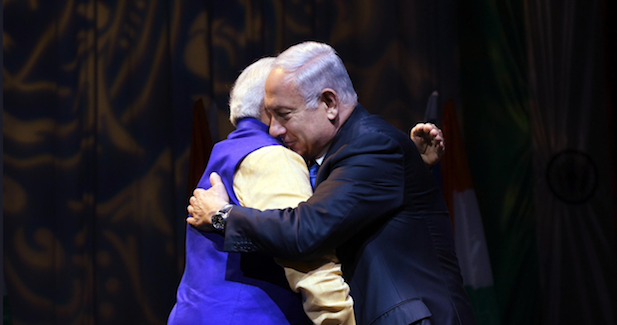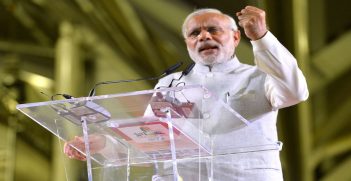Modi’s Landmark Visit to Israel

Narendra Modi’s visit to Israel this week is the first ever by an Indian prime minister. It’s a result of India’s pragmatic new foreign policy towards Israel, one based on its strategic interests and no longer dependent on its Palestine policy.
Prime Minister Modi is scheduled to meet Israeli Prime Minister Benjamin Netanyahu, call on President Reuven Rivlin, address the Indian community in Tel Aviv and pay homage to the Indian soldiers at the Indian cemetery in Haifa. The summit level meetings will discuss an array of common interests with focus on economic, defence and technological cooperation to deepen India-Israel bilateral engagement.
This year marks 25 years of diplomatic ties that began when India established diplomatic relations with Israel in 1992. Since then the relationship between India and Israel has grown in multiple areas. But Prime Minister Modi’s visit to Israel is a landmark move in India’s approach to Israel with considerable defence and diplomatic ramifications.
The evolution of India’s diplomacy towards Israel
From the wary association of the Cold War period to a deepening strategic partnership, the India-Israel relationship has come a long way.
Throughout the Cold War era India and Israel could not form sound bilateral ties despite their many common values and traits: both are ancient civilisations which regained independence in an anti-imperialist struggle against the declining British Empire, producing the only working democracies in their distinctly non-democratic and tense militarised security environments.
Although India did not subscribe to the Partitioning of Palestine plan of 1947 and voted against Israel’s admission to the United Nations in 1949, it finally recognised Israel as a nation in 1950 but did not give diplomatic recognition. A combination of factors shaped India’s approach towards Israel during the Cold War period including: India’s legacy of anti-colonialism; its strategic move to counter Pakistani influence in the Muslim-dominated Arab world; Nehru’s realpolitik on the Kashmir issue; the need to safeguard supply of oil reserves from Gulf countries; and domestic political considerations. Consequently, India supported the Palestinian Liberation Organisation (PLO); it allowed an embassy of the PLO to open in New Delhi and distanced itself from Israel. On top of this India’s non-alignment policy meant that the dynamics of Cold War international politics put India and Israel on the other side of the aisle.
After the demise of the Soviet Union, its long-standing defence and strategic ally, India, free from the Cold War ideological paradigm, embarked on a massive task of reformulating its foreign and economic policy. It became important for India to engage with the US and reach out to strategically important and powerful countries with which, during the Cold War period, it had not been able to forge sound bilateral ties. India under Prime Minister Narasimha Rao decided to change its earlier stance and entered into diplomatic relations and signed a 10-year strategic partnership with Israel in 1992.
Growing defence and counterterrorism cooperation
The India-Israel relationship has progressed under subsequent Indian governments. In 2000, the two countries agreed to increase mutual military cooperation. Since then, India and Israel have built a close economic and strategic relationship and India has become one of Israel’s largest business and defence partners.
Both collaborate on counter-terrorism and intelligence sharing. In recent years, the security threat environment in the wake of Islamic extremism and terrorism have strengthened their ties. Today Israel, one the world’s leading defence players, has become an important destination for India’s defence acquisition and collaboration on defence industry sector.
But the India-Israel relationship is not confined to defence and security ties.
Economy and high-tech ties
With the arrival of Prime Minister Modi, it was expected that India would not hesitate to further deepen its natural alliance with Israel. During the visit, economic and high technology ties will figure prominently. The Israeli cabinet has reportedly approved a 23-page document containing scores of bilateral measures and a budget of 280 million shekels (about $79.6 million): bigger than Israel’s for China, Africa and Latin America together.
Israel is a world leader in water conservation and agricultural technology and India is keen to invest and collaborate. In addition, both the nations are investing in a joint research and development fund, collaboration between their space agencies, in digital-health initiatives and closer academic cooperation. Israel also aims to attract Bollywood producers to film in Israel, and to increase from its share of 45,000 out of the total 20 million Indians tourists abroad.
Other measures are aimed at breaking down the barriers to greater bilateral economic ties. Israeli exports to India totalled just $1.1 billion in 2016, not counting diamonds or defence-related goods, down from $1.7 billion in 2010 and just 2% of all Israel’s exports. Indian investment in Israel to date is a mere $17 million. Lack of speedy reforms and red tape in India are cited as hurdles in reaching the full potential of economic and technological cooperation. Enhancing commercial and technological ties will figure in the Modi-Netanyahu meeting.
The backing of Indian-American and Jewish-American lobby groups
The development of India-Israel ties has the backing of Indian American and Jewish American lobbying as well. Modi is accompanied in his Israel visit by a delegation of nearly two dozen Indian Americans and Jewish Americans.
In the 1990s, Indian leaders were aware of the bond that the US and Israel share and the influence that Jewish American lobby wield in Washington. It was realised that the normalisation with Israel would facilitate India’s rapprochement with the US and vice versa. Under Prime Minister Rao, India reached out to the Jewish American community to establish the Indian lobbying network in Washington. In many instances, the Jewish American community has made its substantial network available to the Indian lobby group and embassy; Indian lobbying has bluntly emulated its tactics. In the post 9/11 environment, the Indian lobby has been working with the Israel lobby not only regarding their shared concern about terrorism but also due to the growing and deepening India-Israel strategic partnership. This India-Israel lobbying bonhomie in the US may solidify the impending US-India-Israel triangular strategic partnership.
The first ever visit by an Indian Prime Minister to Israel is the final stamp on India’s changing diplomacy towards Israel that began in 1992. India’s foreign policy towards Israel today is pragmatic, independent of its Arab policy and grounded in strategic and security realities.
Author’s note: Prime Minister Modi’s itinerary does not include the Palestinian Authority headquarters in Ramallah. This visit is exclusive to the state of Israel in a clear message that India is not ready to compromise on the security front.
Dr Ashok Sharma is adjunct faculty at the University of New South Wales, Canberra at Australian Defence Force Academy and deputy chair of the New Zealand Institute of International Affairs, Auckland. He is the author of Indian Lobbying and its Influence in US Decision Making: Post-Cold War published by Sage in 2017.
This article is published under a Creative Commons License and may be republished with attribution.





